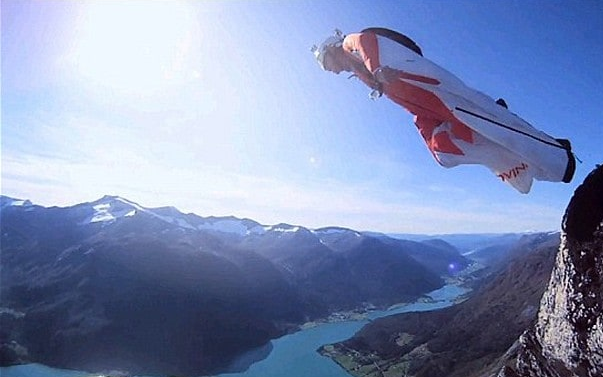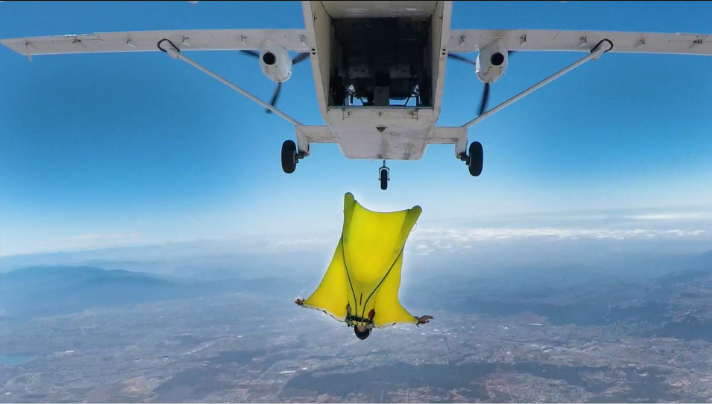I often (very, very often) relate what I read and experience about all sorts of pursuits to trading. I did just that with this article.

The article is about wingsuit base jumping. It asks "Why are so many BASE jumpers dying?" And answers, "The simplest answer is wingsuits"
I have no experience with parachutes, BASE jumping, nor wingsuits. My interest is in trading, and this article has plenty of parallels with our world, food for thought for traders and would-be traders.
So, some quotes from the article, I've bolded (and even underlined) parts of them for emphasis. You might like to substitute the word 'trading' for 'BASE jumping' and ' trading losses' for 'injuries' or 'deaths'. (Apologies in advance to jumpers who might be upset I've compared the deaths of people in their sport to trading losses. When I first started trading I was told 'You've lost some money, don't worry, its not an arm or a leg'. So true. Deaths are not comparable with trading losses).
"There is no single factor, and there is truth in every statement about ego, video, complacency, access, ... etc. ... But if we were to work on just one thing, it would be education ... The simple truth is that wingsuit BASE jumpers don't know what they are getting into, don't know how to practice the sport safely, and don't even know enough to know how little they know. "
Wingsuit BASE jumping ... the stakes are as high, and the margins are as thin, as the rewards are unforgettable. And beautiful. And primal. And extremely addictive.
What's more worrying about wingsuit BASE fatalities, though, is that there appears to be no consistent bias toward experience ... there also seems to be an alarming number of highly experienced, veteran wingsuiters crashing.
- The question facing the BASE community now is whether luck could've helped ... and if not luck, then what, exactly? Smarter training? More experience? More education? Increased regulation?
- Perhaps the most confounding question, though, is why so many people seem to believe that the unthinkable won't happen to them.
From as early as I can remember, I had flying dreams. Once, at age 10, I cut up a cardboard box and fashioned wings, which I then strapped to my arms with pipe cleaners. I took my creation to a porch on the second story of my house in Dobbs Ferry, New York. As I stood atop the railing, cardboard wings lashed to my arms, I recall my seven-year-old sister standing in the grass beneath, pleading and crying at the sight of what I was about to do. I vividly recall a sense of confidence that my design was foolproof; I was certain that when I jumped, flight would ensue, just as in my dreams. I jumped. I landed so hard that my knee went through my jaw and knocked me out.
Figuring out why the best are dying confounds ... just about everyone I've spoken to in the wingsuit BASE world. "It's really puzzling to me," says Rich Webb. "I wish I knew, but I think it has to do with complacency."
Webb points out that many of the best are dying on flight lines that might be considered either "easy" for them, or they're lines that they've done before. "It comes down to the fact that they're so comfortable in a stupidly high-risk environment," says Webb. "We just don't have the luxury of margins in our sport, so at some point it catches up to you if you're not on it all the time."
- "I would say so many experienced wingsuiters are dying because they are trying to execute jumps with very low margin for error. Eventually when you make a mistake you hope you have room. And now low margins are so standard in the sport. It just kills people."
The reason so many wingsuit BASE jumpers believe that accidents won't happen to them is easy to see: that mentality is a prerequisite to taking up the sport. It's like marriage. No one gets married thinking that it's going to end, even though the statistics show it might.
Matt Gerdes, the owner of Squirrel wingsuits, argued for more education on Facebook. "Right now, in 2016, all of the information and knowledge that we need to fly safely exists. Unfortunately, what the sport also lacks is a desire by its participants to learn. People have to understand that education is a huge factor, and paying for information that may save your life is worth it."
--
There is plenty in there for both new and experienced traders:
- The simple truth is that new traders don't know what they are getting into, don't know how to practice trading safely, and don't even know enough to know how little they know. "
- there also seems to be an alarming number of highly experienced, veteran traders crashing
- Perhaps the most confounding question, though, is why so many people seem to believe that the unthinkable won't happen to them
- I vividly recall a sense of confidence that my trading plan was foolproof
- "It comes down to the fact that they're so comfortable in a stupidly high-risk environment. We just don't have the luxury of margins ... at some point it catches up to you if you're not on it all the time."
- "they are trying to execute ... with very low margin for error. Eventually when you make a mistake you hope you have room. And now low margins are so standard in the sport."
- The reason so many trader believe that losses won't happen to them is easy to see: that mentality is a prerequisite to taking up the sport. It's like marriage. No one gets married thinking that it's going to end, even though the statistics show it might.

To any jumpers reading, stay safe and have fun!




